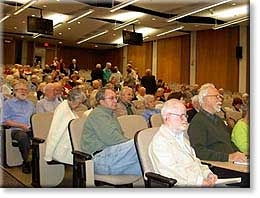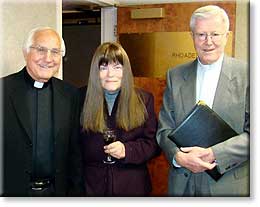Catholica
July 5, 2008
http://www.catholica.com.au/gc2/occ/014_occ_030708.php
A reflection on all that happened…
I recently completed a five-week tour of the U.S.A. in which I spoke at fifteen different venues around that country. It was exhausting, and it has taken me some time to recover, but I am now able to reflect on all that happened.
Part of the audience at Bishop Robinson's address at Temple University, Philadelphia. "My overwhelming thought was that, if the church loses these people, it has lost its very soul." …Geoffrey Robinson
Part of the audience at Bishop Robinson's address at Temple University, Philadelphia. "My overwhelming thought was that, if the church loses these people, it has lost its very soul." …Geoffrey Robinson
 |
| Part of the audience at Bishop Robinson's address at Temple University, Philadelphia. |
In his letter asking me to cancel the tour, Cardinal Giovanni Battista Re, Prefect of the Congregation for Bishops, said, "It has been brought to my attention by some Bishops in the United States who are concerned that you have been invited by some organizations that are not in communion with the Catholic Church…". This is the exact opposite of my experience. The people who came to listen were mainly older people who had spent their lives as faithful and loyal Catholics, raising their children in that faith and supporting the church in every way they could. They still practise their faith. Yes, there were also victims present, and married priests and gay people and three Catholic women ordained as priests. Some of these were angry, some disillusioned and many were struggling hard to keep faith in the church. But even these disaffected people still cared and still wanted to see a better church. To dismiss the entire audience as "not in communion with the church" is a complete failure to understand the book I have written or the response it has evoked among many thousands of Catholics of every age. My overwhelming thought was that, if the church loses these people, it has lost its very soul.
I met many wonderful and inspiring people who welcomed me and invited me into their homes. Most were from the organization called Voice of the Faithful, that started in Boston in 2002 in response to the revelations of sexual abuse there and wants to see a comprehensive response to those revelations. If this makes them "not in communion" with the church, then we all have a most serious problem!!
Part of the audience at Bishop Robinson's address at Temple University, Philadelphia. "My overwhelming thought was that, if the church loses these people, it has lost its very soul." …Geoffrey Robinson
 |
| Bishop Robinson with Bishop Tom Gumbleton and Dr Ingrid Shafer at Temple University. |
Bishop Robinson with Bishop Tom Gumbleton and Dr Ingrid Shafer at Temple University. "The American church has some massive problems before it." …Geoffrey Robinson
I naively thought that the American church would be similar to the Australian church, but found myself continually having to revise my ideas and adapt to a very different world. This was the single greatest difficulty I had on the tour, especially when people tried to involve me in matters that I did not really understand. I was overwhelmed with evidence of incompetence and far worse, though the canon lawyer in me kept warning that I needed to hear all sides of the story first. I am still confused about the extent of incompetence and wrongdoing by bishops, but came away with the clear conviction that the American church has some massive problems before it. It is said that ex-Catholics constitute the second largest religion in the country, and this trend may well continue.
I returned to find on my desk the letters from thirteen U.S. bishops asking me not to go. I am not saying that I was not aware of their existence, but in fact I saw them only on my return. They all quote the statement of the Australian bishops and it is clear that both this statement and the letters of the U.S. bishops were orchestrated by Cardinal Re.
Bishop Robinson's "difficulties" with the statement from the Australian Bishops…
I have had the opportunity to study the statement of the Australian bishops more carefully. I have several difficulties with this statement.
- Firstly, it says that I question the teaching authority of the church and quotes John's gospel concerning the promise of Jesus to send the Holy Spirit to the apostles "in order to lead them into the fullness of the truth". In this the statement appears to confuse teaching authority with infallibility. I do not deny that Jesus sent the Holy Spirit and I do not deny the teaching authority of the church, as even a cursory reading of my book would show. What I question is the teaching on infallibility and especially on "creeping infallibility", in which, even without the formal apparatus of infallibility, Catholics are told that they must believe many truths. The bishops appear to brush aside the very real problems associated with this phenomenon.
- Secondly, it says that my questioning of authority is connected to my "uncertainty about the knowledge and authority of Christ himself." But surely the real question is not where my doubts concerning the knowledge of Jesus come from, but rather where the certainties of the bishops come from? I point out that the biblical evidence is conflicting and that "We are, after all, speaking about what went on within the mind of Jesus, an individual unlike any other who has ever walked on this earth, a person within whom the divine and the human were bound together in a singular manner." The bishops make no attempt to explain where their certainties come from.
- Thirdly and most importantly, the statement makes no comment on my book as a response to sexual abuse, though this is its very raison d'etre. It implies, therefore, that one may not ask questions about church teachings or laws under any circumstances, not even in responding to abuse. My book starts from the opposite end, the fact of abuse, and says that, if we are to overcome it, we must seek out the deepest causes both of the abuse and of the inadequate response to abuse, and, in doing this, we must be free to follow the argument wherever it leads. If it causes us to question teaching or practice concerning creeping infallibility or sexual morality or obligatory celibacy, we must be free to do so. The bishops do not address these issues, or how we are to overcome abuse if we are not free to ask the questions that arise.
I remain convinced that we have a long way to go and that, if we are ever to look to the future with a clear conscience, we must be free to ask the questions that spontaneously arise from the terrible fact of abuse and the inadequate response to it. Until that happens, we are trying to manage rather than truly confront the problem.
Any original material on these pages is copyright © BishopAccountability.org 2004. Reproduce freely with attribution.